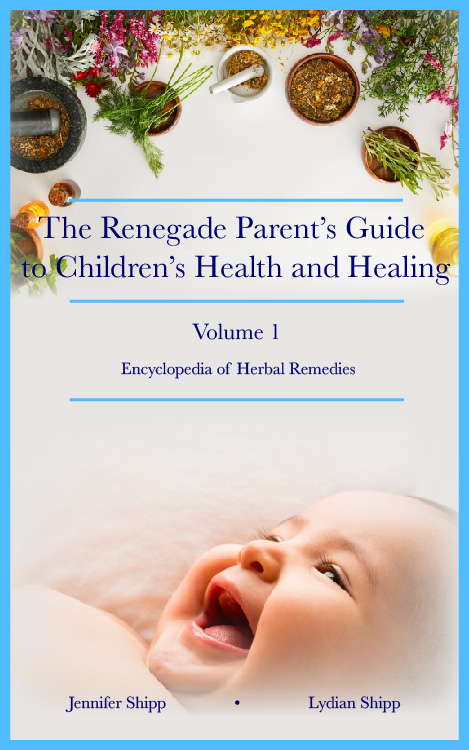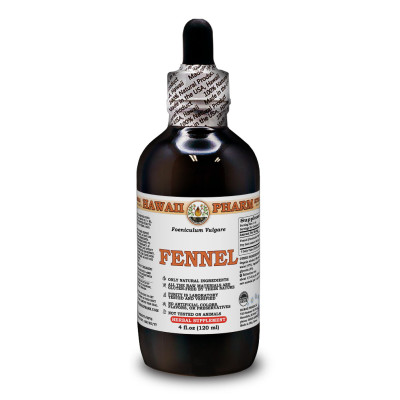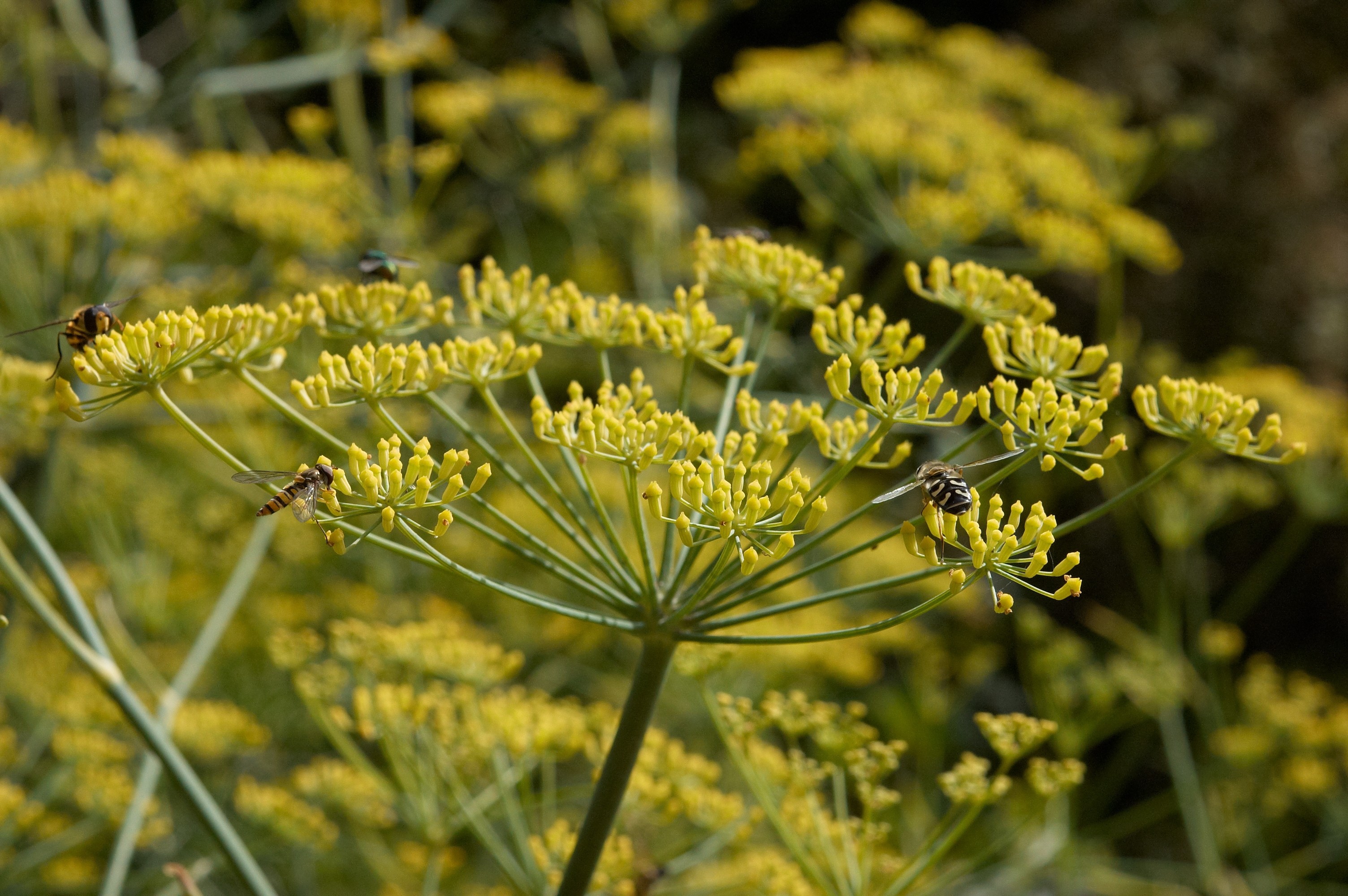Foeniculum vulgare / Fennel
Foeniculum vulgare, also known as fennel, is an herbal galactagogue that can be administered directly to babies as an oral or topical medicine, or it can be administered to a baby via the mother through breast milk. As an herb that increases breast milk production, Foeniculum vulgare is an excellent choice for mothers with babies who suffer from colic. While this is an herb that improves breast milk production, it is also secreted in breast milk to naturally treat colic, infant reflux, and other health issues.Studies have found that Foeniculum vulgare can increase milk volume naturally as well as the fat content of breast milk and infant weight gain. This herb does not increase prolactin levels, but rather works through another mechanism of action. Though this is an excellent herbal remedy for low breast milk production, treatment with fennel by nursing mothers should be limited to 2 weeks (14 days of continuous, consistent dosing) to prevent babies from developing anethole toxicity. Anethole is a medicinal substance that is found in fennel, dill, and in anise. That being said, if you are not continuously dosing your baby every 4 to 6 hours over the course of 14 days, you may not need to take breaks from treatment with fennel. Also, many babies do not develop anethole toxicity even when given Gripe Water or other fennel-containing herbal remedies continuously for 14 days. So use your best judgment and simply be aware of the possibility of anethole toxicity. Note that treatment with an herbal remedy for infant reflux or colic can help your baby stop feeling so much pain and be better nourished which can, in turn, help them overcome the gut dysbiosis and inflammation that causes infant colic and infant reflux in the first place.

Foeniculum vulgare contains the following substances that have a medicinal action in the body:
- Anethole
- Anethole is a terpenoid that is secreted in breast milk.
- Nursing mothers should limit fennel dosing to 2 weeks to prevent anethole toxicity in newborn infants.
- Anethole is found in higher quantities in anise.
- Anethole makes up 50-60% of fennel oil.
- Anethole is about 13 times sweeter than refined sugar.
- Fenchone
- Fenchone is found in absinthe and fennel volatile oil.
- Fenchone is also found in Cannabis in very small quantities.
- This substance is a pain reliever.
- Fenchone may also be the substance in fennel that helps repair gut flora naturally in babies with colic / infant reflux.
- Fenchone relaxes intestinal muscles to release gas bubbles.
- Estragole
- Both fennel and anise (Pimpinella anisum) contain estragole.
- 1,8-cineole (eucalyptol)
- A number of plants contain this substance.
- 1-8-cineole is an anti-inflammatory agent.
Allergic Reactions to Fennel
Some babies are allergic to fennel. As a member of the Apiacea family, fennel should be avoided if the baby is allergic to carrots or celery, or other members of this plant family. Indeed, in rare cases, mothers may be allergic to fennel as well. This herb has an impact on the liver and it can raise liver enzyme levels in some rare cases. This herb is “generally recognized as safe” (GRAS) by the FDA and it is a common food-spice so fennel allergy and adverse reactions to this herb are exceedingly rare. Nonetheless, it deserves mention that fennel might cause issues such as light sensitivity or a tendency toward sunburn via its effects on the liver. Be careful taking your baby out into the sunlight during treatment with fennel to avoid sunburns. Allergy to fennel can also cause respiratory symptoms in babies or in mothers. The Kid-Friendly Medicines Living Database - NOW AVAILABLE! Click here to sign up...
The Kid-Friendly Medicines Living Database - NOW AVAILABLE! Click here to sign up...
Foeniculum vulgare to Increase Breast Milk Naturally
Women commonly experience breast inflammation while breast feeding. Herbs like fennel can help to diminish inflammation. Traditionally, 1 teaspoon fennel seeds and 1 teaspoon marshmallow root were combined with 8 ounces of hot water to make a “tea”. This tea can then becooled and applied topically to the breast to relieve mastitis naturally.Women can also take fennel tea or “Gripe Water” (see below) to administer fennel to their baby via the breast milk. For women who wish to administer the healing effects of fennel via breastmilk, Gripe Water should be consumed twice daily (administer a full 4 ounces by mouth as a tea) every 12 hours. It can take between 1 to 24 hours for the medicinal substances in fennel to reach the breast milk so be aware that this herbal remedy for infant colic may take some time to start working through this method.
Foeniculum vulgare: Herbal Remedy for Infant Colic
Fennel is recognized as safe and fennel is “generally recognized as safe” (GRAS) by the U.S. Food and Drug Administration. In infants, fennel is regularly used alone and in combination with other herbs to treat colic and infant reflux. Because fennel is often administered as an herbal remedy for colic in babies, the medicinal substances derived from fennel that are found in breast milk are not likely to be harmful at the normal doses that the mother might take.Fennel should not be administered to children with epilepsy, cancer, or children who take multiple medications.
Fennel for Infant Colic: Gripe Water
Scientific studies have demonstrated that Gripe Water can reduce infant colic crying time by more than 50% after 4 days (or less) of treatment.“Gripe Water” is made with at least one of the following herbs:
- Fennel
- Dill
- Anise
An infusion of fennel and other herbs are combined with stevia and bicarbonate of soda to relieve colic in infants.
Below is a recipe for daytime Gripe Water:
Combine all of the following ingredients in a small 8 ounce glass jar with a lid:
- 1 teaspoon crushed or powdered fennel seeds
- 1 teaspoon Ginger
- Aluminum-free Baking Soda (¼ teaspoon)
- 1 cup of water that has been brought to a boil that is still hot.
As soon as the water comes to a boil, pour it into the jar and cover the jar with a lid to prevent the volatile oils from escaping. Allow the brew to steep for 4 hours (or as long as possible) before using. Waiting for 4 hours to use the Gripe Water enhances its effectiveness.
Administer 1 teaspoon of the cooled mixture from the jar up to 3 times per day for a baby.
Discard the unused portion every 48 hours. Note that nursing mothers can drink the unused portion which will enhance breast milk production and also help ensure that the baby continues to receive the medicine through the mother’s milk supply. However, take a 3 day break from administering Gripe Water every 2 weeks if you are administering this herbal remedy for colic continuously (every 4 to 6 hours) for 14 days and also take short breaks from drinking the leftover gripe water to prevent anethole toxicity in babies. Note that if your baby does not take gripe water daily several times per day, you do not need to worry about this two week rule.
NOTE for Busy Moms: If you don’t want to drink the leftover tea or if you simply can’t make this tea daily or every two days to treat your baby for colic at home, consider freezing ice cubes of Gripe Water and thawing them out for daily dosing.
Nepeta cataria / Catnip
Note that some Gripe Water recipes also include catnip / Nepeta cataria with fennel and ginger. Catnip has sedative effects that make it appropriate for use in a nighttime Gripe Water brew as well. Add up to 1 teaspoon of Nepeta cataria to the jar if you choose to add this herb.Cinnamon / Cinnamomum verum
Cinnamon is another herb that can be added to the daytime Gripe Water brew as an herbal remedy for gas and indigestion in babies. Add just a dash of cinnamon to the Gripe Water jar if you choose.Clove / Syzygium aromaticum
Clove is another herb that can be added to the daytime Gripe Water as an herbal remedy for gas in babies. This herb is also a mild pain reliever. Add just a pinch of it to the Gripe Water jar.Stevia
If you choose a product that contains pure stevia without any artificial ingredients or additional flavorings added, this herb can also help reduce inflammation and bloating in babies. Add up to 10 drops of pure stevia extract or a pinch of pure powdered stevia to your Gripe Water jar to improve its palatability.Other herbs that have been scientifically demonstrated for their effectiveness in Gripe Water include:
- Carbo vegetabilis / Vegetable Charcoal
- Blackthorne / Prunus spinosa
- Caraway / Carum carvi
- Peppermint / Mentha piperita
Gripe water is not habit forming and if you make it at home, it does not contain toxic chemicals like sorbate, artificial colors, or artificial flavors. Homemade Gripe Water also does not contain vegetable glycerin (which can harm teeth – click here to read more about how to remineralize teeth to prevent or heal cavities naturally and how vegetable glycerin gets in the way of this process).
Below is a recipe for night time Gripe Water:
Combine all of the following ingredients in a small 8 ounce glass jar with a lid:
- 1 teaspoon crushed or powdered fennel seeds
- 1 teaspoon ginger
- Aluminum-free Baking Soda (¼ teaspoon)
- 1 cup of water that has been brought to a boil that is still hot.
As soon as the water comes to a boil, pour it into the jar and cover the jar with a lid to prevent the volatile oils from escaping. Allow the brew to steep for 4 hours (or as long as possible) before using. Waiting for 4 hours to use the Gripe Water enhances its effectiveness.
Administer 1 teaspoon of the cooled mixture from the jar up to 3 times per day for a baby. Discard the unused portion every 48 hours.
The recipe above, of course, is identical to the daytime recipe for Gripe Water, but in addition to the core herbs in this remedy, for a night-time Gripe Water mix, you can add the following herbs:
- Chamomile / Matricaria recutita
- Lemon Balm / Melissa officinalis
- Passionflower / Passiflora incarnata
Note that some infants may be allergic to chamomile. As such, you should watch your baby the first and second time that you administer this herb for signs of allergic reaction. Add one herb to the recipe every 2 nights and make sure your baby responds well to each one. After each of the above herbs have been tested, you can then combine all five herbs (fennel, ginger, chamomile, lemon balm, passionflower) and use them together to make a powerful sleepytime Gripe Water that can relieve infant colic naturally (as well as infant reflux) and help your baby sleep at the same time.
Fennel: Herbal Remedy for Infant Reflux
Fennel is almost always included in Gripe Water as an herbal remedy for infant colic (see the recipe above), but it can also be used as an herbal remedy for infant reflux and hiccups.Fennel Essential Oil as a Natural Remedy for Head Lice
Fennel essential oil as a 15% concentration in a carrier oil such as hexane-free castor oil has been used as an effective treatment for head lice. Dilute the essential oil down to a 15% concentration with castor oil and leave it in place for at least 60 minutes. Comb out with a nit comb. Apply daily for at least 5 days.
 doTERRA Fennel Essential Oil 15 ml
doTERRA Fennel Essential Oil 15 ml
Fennel Medicinal Effects
Foeniculum vulgare / fennel has the following medicinal effects:- Hiccups / Hiccoughs
- Infant Reflux
- Carminative
- Intestinal anti-spasmodic
- Opththalmic
- Mild expectorant in babies
- Aromatic
- Estrogenic effect
- Eyewash for babies
- Natural Head Lice Treatment / Pediculicidal / Pediculus capitus
Fennel: Dosing Recommendations for Babies
NOTE: Some experts recommend that fennel treatment be discontinued after 2 weeks. Longer term use of fennel by the mother to treat colic in babies can lead to anethole toxicity in newborns.Administer fennel seeds lightly crushed in one of the following ways:
Infusion
Administer 1-2 grams daily of fennel seed powder as a hot tea / infusion that is then cooled before dosing. Heat 4 ounces of water to boiling, then pour the water into a mug with 1-2 grams of fennel. Allow the tea to cool completely. Administer the infusion orally in a baby bottle or via a dropper. Use smaller doses in very small babies and newborns.Hydrosol
Administer 6-12 mL of hydrosol daily to an infant. Divide the total dose into 3-6 different doses of 1-4 mL each every 4-8 hours or as needed.Tincture
Administer 1.5 to 15 mL daily as a tincture to babies. Divide this total dose into 3-6 different doses of 0.25 to 2.25 mL each every 4-8 hours or as needed.
Click here to buy Foeniculum vulgare tincture.
 Click here to subscribe to the Living Database!
Click here to subscribe to the Living Database!
Resources:

 Fennel is an important natural remedy for colic and infant reflux. It is a common ingredient in Gripe Water.
Fennel is an important natural remedy for colic and infant reflux. It is a common ingredient in Gripe Water. Naturevibe Botanicals Fennel Seed Ground Powder 5lb | Foeniculum Vulgare | Indian Spice | [Packaging May Vary]
Naturevibe Botanicals Fennel Seed Ground Powder 5lb | Foeniculum Vulgare | Indian Spice | [Packaging May Vary]
 Organic Ground Ginger Powder, 2 Pounds (32 Ounce), Great Flavor and Highly Aromatic, Fine Loose Powder for Better Mixing without Settling, Best for Cooking, Baking, Tea & More
Organic Ground Ginger Powder, 2 Pounds (32 Ounce), Great Flavor and Highly Aromatic, Fine Loose Powder for Better Mixing without Settling, Best for Cooking, Baking, Tea & More
 Prescribed For Life Sodium Bicarbonate Powder | Organic Aluminum Free Baking Soda | Bicarbonato de Sodio Organico sin Alumino | USP Grade - Higher Quality & Purity Than Food Grade (1 kg / 2.2 lb)
Prescribed For Life Sodium Bicarbonate Powder | Organic Aluminum Free Baking Soda | Bicarbonato de Sodio Organico sin Alumino | USP Grade - Higher Quality & Purity Than Food Grade (1 kg / 2.2 lb)




























